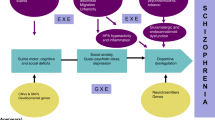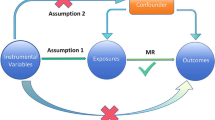Abstract
Purpose of Review
Insomnia has a bi-directional relationship with both psychiatric and addictive disorders, and recent twin studies have shown an overlap in the genetic risk between insomnia and these conditions. Given the multiple single nucleotide polymorphisms (SNPs) identified with small effect sizes in prior genome-wide association studies (GWAS), a polygenic risk score (PRS) estimates the disorder’s overall genetic risk using these SNPs. This narrative review evaluates the emerging data on the relationship between the genetic risk for insomnia and these disorders.
Recent Findings
The studies show that PRS of insomnia is positively associated with sleep disturbance symptoms, alcohol use disorder, marijuana use, and obsessive-compulsive disorder.
Summary
This emerging evidence shows a shared genetic risk between insomnia and these disorders. Future studies should compute insomnia PRS with larger sample sizes, elaborate on how the PRS interacts with other risk factors for disease, and identify underlying subtypes of these disorders.


Similar content being viewed by others
Data Availability
No datasets were generated or analysed during the current study.
References
Papers of particular interest, published recently, have been highlighted as: • Of importance •• Of major importance
Roth T, Coulouvrat C, Hajak G, Lakoma MD, Sampson NA, Shahly V, et al. Prevalence and perceived health associated with insomnia based on DSM-IV-TR; International Statistical Classification of Diseases and Related Health Problems, Tenth Revision; and Research Diagnostic Criteria/International Classification of Sleep Disorders, Second Edition criteria: results from the America Insomnia Survey. Biol Psychiatry. 2011;69(6):592–600.
Taylor DJ, Mallory LJ, Lichstein KL, Durrence HH, Riedel BW, Bush AJ. Comorbidity of chronic insomnia with medical problems. Sleep. 2007;30(2):213–8.
Baglioni C, Battagliese G, Feige B, Spiegelhalder K, Nissen C, Voderholzer U, et al. Insomnia as a predictor of depression: a meta-analytic evaluation of longitudinal epidemiological studies. J Affect Disord. 2011;135(1-3):10–9.
Perlis ML, Giles DE, Buysse DJ, Tu X, Kupfer DJ. Self-reported sleep disturbance as a prodromal symptom in recurrent depression. J Affect Disord. 1997;42(2-3):209–12.
Pigeon WR, Hegel M, Unutzer J, Fan MY, Sateia MJ, Lyness JM, et al. Is insomnia a perpetuating factor for late-life depression in the IMPACT cohort? Sleep. 2008;31(4):481–8.
Barclay NL, Kocevska D, Bramer WM, Van Someren EJW, Gehrman P. The heritability of insomnia: a meta-analysis of twin studies. Genes Brain Behav. 2021;20(4):e12717.
•• Jansen PR, Watanabe K, Stringer S, Skene N, Bryois J, Hammerschlag AR, et al. Genome-wide analysis of insomnia in 1,331,010 individuals identifies new risk loci and functional pathways. Nat Genet. 2019;51(3):394–403. This is the largest published insomnia GWAS to date.
• Lane JM, Jones SE, Dashti HS, Wood AR, Aragam KG, van Hees VT, et al. Biological and clinical insights from genetics of insomnia symptoms. Nat Genet. 2019;51(3):387–93. This study conducted in-depth analyses of the association between genetic risk for insomnia and risk for psychiatric disorders.
Kranzler HR, Zhou H, Kember RL, Vickers Smith R, Justice AC, Damrauer S, et al. Genome-wide association study of alcohol consumption and use disorder in 274,424 individuals from multiple populations. Nat Commun. 2019;10(1):1499.
Vrieze SI, McGue M, Miller MB, Hicks BM, Iacono WG. Three mutually informative ways to understand the genetic relationships among behavioral disinhibition, alcohol use, drug use, nicotine use/dependence, and their co-occurrence: twin biometry, GCTA, and genome-wide scoring. Behav Genet. 2013;43(2):97–107.
Gehrman PR, Meltzer LJ, Moore M, Pack AI, Perlis ML, Eaves LJ, Silberg JL. Heritability of insomnia symptoms in youth and their relationship to depression and anxiety. Sleep. 2011;34(12):1641–6.
Lind MJ, Gehrman PR. Genetic pathways to insomnia. Brain Sci. 2016;6:4.
Veatch OJ, Keenan BT, Gehrman PR, Malow BA, Pack AI. Pleiotropic genetic effects influencing sleep and neurological disorders. Lancet Neurol. 2017;16(2):158–70.
Ban HJ, Kim SC, Seo J, Kang HB, Choi JK. Genetic and metabolic characterization of insomnia. PloS One. 2011;6(4):e18455.
Byrne EM, Gehrman PR, Medland SE, Nyholt DR, Heath AC, Madden PA, et al. A genome-wide association study of sleep habits and insomnia. Am J Med Genet B Neuropsychiatr Genet. 2013;162B(5):439–51.
Hammerschlag AR, Stringer S, de Leeuw CA, Sniekers S, Taskesen E, Watanabe K, et al. Genome-wide association analysis of insomnia complaints identifies risk genes and genetic overlap with psychiatric and metabolic traits. Nat Genet. 2017;49(11):1584–92.
Jansen PR, Watanabe K, Stringer S, Skene N, Bryois J, Hammerschlag AR, et al. Genome-wide analysis of insomnia (N=1,331,010) identifies novel loci and functional pathways. https://www.biorxivorg/content/101101/214973v2.2019.
Watanabe K, Jansen PR, Savage JE, Nandakumar P, Wang X, Me Research T, et al. Genome-wide meta-analysis of insomnia prioritizes genes associated with metabolic and psychiatric pathways. Nat Genet. 2022;54(8):1125–32.
Choi SW, Mak TS, O'Reilly PF. Tutorial: a guide to performing polygenic risk score analyses. Nat Protoc. 2020;15(9):2759–72.
Torkamani A, Wineinger NE, Topol EJ. The personal and clinical utility of polygenic risk scores. Nat Rev Genet. 2018;19(9):581–90.
Jansen IE, Savage JE, Watanabe K, Bryois J, Williams DM, Steinberg S, et al. Genome-wide meta-analysis identifies new loci and functional pathways influencing Alzheimer's disease risk. Nat Genet. 2019;51(3):404–13.
Kocevska D, Trajanoska K, Mulder RH, Koopman-Verhoeff ME, Luik AI, Tiemeier H, van Someren EJW. Are some children genetically predisposed to poor sleep? A polygenic risk study in the general population. J Child Psychol Psychiatry. 2023. https://doi.org/10.1111/jcpp.13899.
Ma T, Chen H, Lu Q, Tong X. Polygenic risk for insomnia in adolescents of diverse ancestry. Front Genet. 2021;12:654717.
Koshmanova E, Muto V, Chylinski D, Mouraux C, Reyt M, Grinard M, et al. Genetic risk for insomnia is associated with objective sleep measures in young and healthy good sleepers. Neurobiol Dis. 2022;175:105924.
• Chakravorty S, Kember RL, Mazzotti DR, Dashti HS, Toikumo S, Gehrman PR, Kranzler HR. The relationship between alcohol- and sleep-related traits: results from polygenic risk score and Mendelian randomization analyses. Drug Alcohol Depend. 2023;251:110912. This is one of the first studies to examine polygenic risk between insomnia and alcohol use disorders.
Winiger EA, Ellingson JM JM, Morrison CL, Corley RP, Pasman JA, Wall TL, et al. Sleep deficits and cannabis use behaviors: an analysis of shared genetics using linkage disequilibrium score regression and polygenic risk prediction. Sleep. 2021;44(3):zsaa188. https://doi.org/10.1093/sleep/zsaa188.
Forthman KL, Kuplicki R, Yeh HW, Khalsa SS, Paulus MP, Guinjoan SM. Transdiagnostic behavioral and genetic contributors to repetitive negative thinking: a machine learning approach. J Psychiatr Res. 2023;162:207–13.
Beaupre LMM, Tiwari AK, Golcalves VF, Zai CC, Marshe VS, Kewis CM, et al. Corrigendum: potential genetic overlap between insomnia and sleep symptoms in major depressive disorder: a polygenic risk score analysis. Front Psychiatry. 2022;13:893816.
Strom NI, Grove J, Meier SM, Baekvad-Hansen M, Becker Nissen J, Damm Als T, et al. Polygenic heterogeneity across obsessive-compulsive disorder subgroups defined by a comorbid diagnosis. Front Genet. 2021;12:711624.
Spielman A, Caruso L, Glovinsky P. A behavioral perspective on insomnia treatment. Psychiatr Clin North America. 1987;10:541–53.
Hauri P, Olmstead E. Childhood-onset insomnia. Sleep. 1980;3(1):59–65.
Kranzler HR, Davis CN, Feinn R, **wala Z, Khan Y, Oikonomou A, et al. Adverse childhood events, mood and anxiety disorders, and substance dependence: gene x environment effects and moderated mediation. medRxiv. 2023. https://www.medrxiv.org/content/10.1101/2023.10.24.23297419v1
Funding
This work was supported by the following grants: I01 CX001957 (S.C.), 1K01LM012870 (O.J.V.), 5R21HD107535 (O.J.V.), R01 HL143790 (P.R.G), and R01 NR018836 (P.R.G.).
Author information
Authors and Affiliations
Contributions
All authors contributed to the writing of manuscript. All authors reviewed the final manuscript. S.C. prepared the Figures.
Corresponding author
Ethics declarations
Competing interests
The authors declare no competing interests.
Human and Animal Rights and Informed Consent
No animal or human subjects by the authors were used in this study.
Additional information
Publisher’s Note
Springer Nature remains neutral with regard to jurisdictional claims in published maps and institutional affiliations.
Rights and permissions
About this article
Cite this article
Chakravorty, S., Veatch, O.J., Mazzotti, D.R. et al. The Relationship Between Genetic Risk for Insomnia and Psychiatric Disorders. Curr Sleep Medicine Rep 10, 132–138 (2024). https://doi.org/10.1007/s40675-024-00288-7
Accepted:
Published:
Issue Date:
DOI: https://doi.org/10.1007/s40675-024-00288-7




